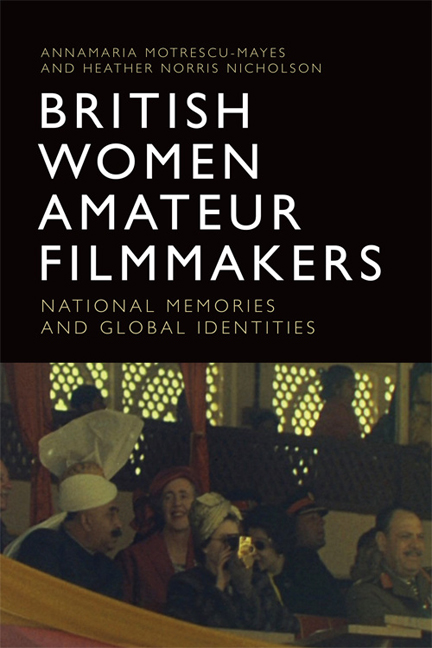Book contents
- Frontmatter
- Contents
- List of Figures
- List of Sources and Abbreviations
- Acknowledgements
- Foreword
- 1 Amateur Women Filmmakers as Producers of Cultural Meaning
- 2 Webs of Production and Practice
- 3 Resisting Colonial Gendering while Domesticating the Empire
- 4 Cameras Not Handbags: The Essential Accessory
- 5 Through Women's Lens: Imperial and Postcolonial Class and Gender Hierarchies
- 6 Teacher Filmmakers
- 7 British Women's Media Narratives of Gender and Collective Memory
- 8 Reimagining Boundaries: Amateur Animations
- Afterword
- Selected Bibliography
- Index
3 - Resisting Colonial Gendering while Domesticating the Empire
Published online by Cambridge University Press: 12 November 2019
- Frontmatter
- Contents
- List of Figures
- List of Sources and Abbreviations
- Acknowledgements
- Foreword
- 1 Amateur Women Filmmakers as Producers of Cultural Meaning
- 2 Webs of Production and Practice
- 3 Resisting Colonial Gendering while Domesticating the Empire
- 4 Cameras Not Handbags: The Essential Accessory
- 5 Through Women's Lens: Imperial and Postcolonial Class and Gender Hierarchies
- 6 Teacher Filmmakers
- 7 British Women's Media Narratives of Gender and Collective Memory
- 8 Reimagining Boundaries: Amateur Animations
- Afterword
- Selected Bibliography
- Index
Summary
‘Who, Raymond? Never. He never touched it. It was my mother and my sister who used the camera and took cine-films’, said Nancy Vernede (née Kendall) in 2004 when interviewed about a collection of colonial amateur films made in India in the 1930s and 1940s, and which until then British film archivists catalogued under the title of Vernede Collection and credited it to Raymond Veveysan Vernede, Nancy's husband. From 1928 until India's independence in 1947, Mr Vernede worked in the United Provinces (present-day Uttar Pradesh and Uttarakhand states) as a district officer in the Indian Colonial Service. In her interview, Nancy had fortuitously reattributed the authorship of this 240-minute colonial amateur footage and, perhaps most importantly, exposed it to new critical and theoretical interpretations. Rather than having been the unitary, organic work of a male amateur filmmaker, the film collection now comprised two sets of films. The first five films, made between 1933 and 1935 on black and white 16mm, belonged to Nancy's mother, Isabella Clare Bothwell, who experimented with amateur filmmaking while living in Allahabad at the time when her husband, Sir Charles Henry Bayley Kendall, served as the Judge of the Allahabad High Court (1928–35). The remaining fourteen films, made between 1933 and 1946 on black and white and on colour 8mm film, had been recorded by Nancy's sister, Mrs Barbara Donaldson (née Kendall), while living and travelling across India and England. Nancy's somewhat bemused clarification regarding the authorship of the Kendall Collection pivoted the interpretation of what until then seemed to be an unexceptional set of colonial amateur films made during the final years of the British Raj. The gender-based change in authorship produced an ad hoc ‘terror of method’ – the need to access and verify all possible research sources and methodologies (Eliade 1988: 29). It also prompted several, urgent research questions. For instance, is it necessary or even possible to amend the critical agenda usually employed when discussing man-made colonial amateur films – the default critical perspective applied to most colonial amateur films – such that it could be equally relevant to the analysis of woman-made colonial amateur films? Also, is it possible to establish that a home movie acquires new or nuanced meanings once the gender of the amateur filmmaker is known?
- Type
- Chapter
- Information
- British Women Amateur FilmmakersNational Memories and Global Identities, pp. 57 - 88Publisher: Edinburgh University PressPrint publication year: 2018



